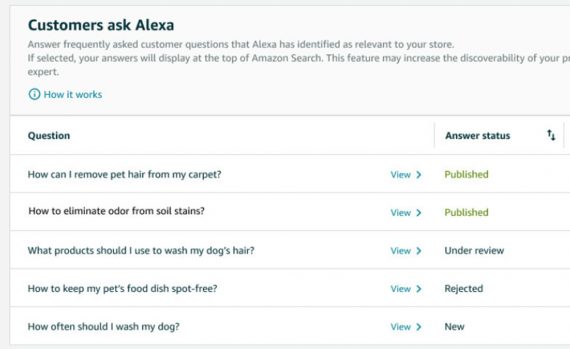Amazon’s “Customers ask Alexa” capability has similarities to search engine queries and may represent a new content distribution channel for mid-sized and enterprise retailers and brands.
For Alexa, a “capability” is something the voice assistant can do, such as play music, make a to-do list, or tell a shopper when her Amazon order has been delivered. In September 2022, Amazon announced a new capability, “Customers ask Alexa,” meant to permit brands and, potentially, retailers to answer questions related to their products.
“Amazon recognizes brands as experts on their products. With this new capability, we have made it easier for brands to connect with customers to help answer common questions and better inform their purchase decisions,” said Rajiv Mehta, general manager of Alexa Shopping at Amazon, in a post on the “About Amazon” site.
The service was first released to a small group of brands in October 2022 and should open to more brands and third-party sellers in 2023, according to Jon Elder, the founder of Black Label Advisor, an Amazon Marketplace consultancy.
Opportunity
This new Alexa capacity represents a new content marketing opportunity and a new way to attract shoppers. Brands can capitalize by creating informative answers to engage potential customers who interact with their products through Alexa. Brands could also include direct links to their Amazon store page, allowing shoppers to purchase products immediately.
As more Amazon shoppers ask questions, research products, or make purchase decisions via voice, the “Customers ask Alexa” capability will become increasingly important for brands and retailers to recognize and use as part of their content marketing strategy. By creating helpful content and guiding prospects through the purchase journey, brands can increase product awareness, drive sales, and create a positive customer experience.
That is the opportunity.
SEO Analogy
The “Customers ask Alexa” capability is similar to a product-related search on Google, wherein the search results page is likely to include manufacturers, brands, and retailers. The difference is that Alexa reads the customer’s answer via a smart speaker, i.e., Amazon Echo.
This is how Amazon described it:
A customer shopping for cleaning products on Amazon.com could ask, “How can I remove pet hair from my carpet?'” A brand can now provide answers to such questions, along with links to its Amazon storefront.
The similarity to search engine optimization is clear. With SEO, businesses — e.g., brands, retailers — create product detail pages, blog posts, and similar content optimized for search engine discovery. When a potential customer searches Google, the business wants its content to rank on the first results page.
With “Customers ask Alexa,” the aim is similar, except the goal is to be the single answer Alexa reads to a shopper.
A difference, however, has to do with keyword research. For Google, a search-engine optimizer must discern which phrases generate the desired traffic. Amazon is telling brands specifically what content is needed.
“Inside Seller Central, there is a list of growing questions Amazon allows a brand owner to type in answers for,” wrote Elder, the Amazon consultant, in a Twitter direct message. “All these answers from sellers go into a ‘bucket’ that Amazon then applies artificial intelligence to decide which answer is the most relevant.
“I expect the vast majority of sellers to invest time in adding answers within Seller Central and for the tool to also become an SEO extension of their optimized listing,” Elder continued.

In Seller Central, Amazon is telling brands what questions need to be answered. Source: Amazon.
Content Distribution
For businesses selling on Amazon, “Customers ask Alexa” may represent a new content distribution channel. A workflow could go something like this.
- A brand finds relevant questions in Seller Central.
- If an answer exists on the brand’s website, repurpose it for “Customers ask Alexa.”
- If it does not exist, create it, and post it on Seller Central and as an article on the brand’s website.
- Test the content, asking Alexa the target question and monitoring how often the brand’s answer is used.
- Optimize until Alexa consistently uses the answer.
There are a few points about this potential workflow.
- It recognizes that content should be owned media. So it should always have its home on a brand’s or retailer’s own website. “Customers ask Alexa” is a distribution channel. If you create content for Alexa, be sure a complete resource is available on your company’s own internet properties.
- Seller Central is now a source of keyword research. The questions Amazon wants brands to answer for Alexa are likely to be good keyphrases for Google and other search engines, too. Ranking first on Google may drive significantly more sales than winning with Alexa.
- Voice search could become a good content channel, attracting new customers and retaining existing ones.




